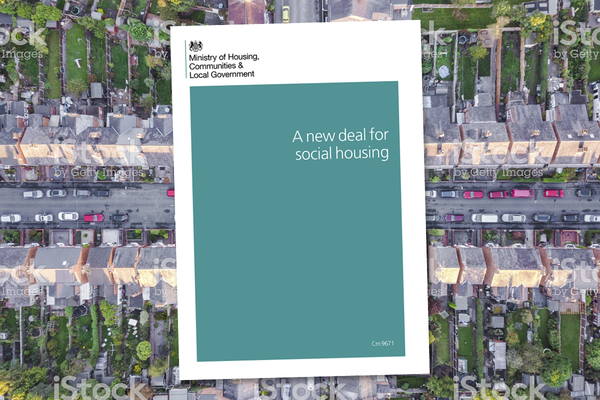You are viewing 1 of your 1 free articles
We need to correctly diagnose social housing stigma
Talk of stigmatisation of social housing tenants conflates two major trends which associations must recognise if they are not to be complicit, writes Paul Taylor
Post-Grenfell, social housing is back on the political agenda, and with it comes the inevitable subject of stigmatisation.
I’d argue the problem we are trying to fix has never been correctly diagnosed – what exactly is this stigma and who is driving it?
There are lots of people living in social housing who identify with no such stigma, and do not feel they are poor, vulnerable or need protecting. The problem is we rarely hear from them.
That’s not to say stigma doesn’t exist.
“Talk of a ‘social housing stigma’ bundles a lot of disparate issues into one catch-all phrase.”
The Social Housing Green Paper describes how tenants at the engagement events often feel they are treated as “second-class citizens” and “benefits scroungers”, rather than “honest and hardworking”.
My contention is that talk of a ‘social housing stigma’ bundles a lot of disparate issues into one catch-all phrase. Breaking these issues down makes them easier problems to solve.
Indeed, the problem isn’t social housing, it’s two different trends that we are in danger of conflating.
The continued demonisation of the poor
Poor-bashing is nothing new. A byproduct of capitalism and neoliberalism, it exists in most societies worldwide. “You’re poor: you didn’t try hard enough.”
Laying the blame squarely on the media, and in particular on shows like Benefits Street, is naive.
The irony is that Benefits Street was one of the only TV shows that allowed poor people to speak for themselves.
The professionals who helped and, sometimes, hindered their lives were mercifully absent. By comparison the sector’s own use of the media has often been ham-fisted, portraying professionals as heroes who rescue the feckless.
“Laying the blame squarely on the media, and in particular on shows like Benefits Street, is naive”
This paternalism still exists – we are always hearing landlords talk about ‘turning people’s lives around’ and protecting ‘the most needy and vulnerable’, a phrase that’s used endlessly.
We need to move away from focusing on what’s wrong, and seek out the skills and inventiveness of local communities, rather than foisting more housing services on them.
We need to avoid casting ourselves as professionals and experts to be listened to.
More authentic tenant voices are finally emerging, not through the mainstream media, but within local communities and social media.
The latter in particular could be a net gain in how we re-articulate and revisit the purpose of social housing.
The solution is to transform our organisations to reconnect with their roots and to rediscover the campaigning zeal of the social movements of the 1960s. One built around the dignity of people, and a modern sense of trust, solidarity and compassion.
The championing of homeownership
The second issue, seeing homeownership as the pinnacle of the housing ladder, is a more recent development.
You simply cannot reduce any stigma around social housing if you imply people should get out of it as soon as practical.
This is actually reinforced by people talking about ‘their beginnings in social housing’. The fact is a lot of sector advocates of social housing didn’t remain there – they bought a home of their own and got out as soon as they could.
Homeownership for the masses is a historical blip affecting just one or two generations. There’s no evidence to suggest it’s a sustainable model for the future.
“The problem with a ladder is there’s always someone at the bottom.”
None of us have any idea what the job market will look like in 10 years’ time, never mind 50, yet we are building homes to last 100 years.
The green paper continues to underline a commitment to fixing ‘broken systems’ through getting more people on the housing ladder. The problem with a ladder is there’s always someone at the bottom.
This national obsession with homeownership as nirvana, together with a continued undersupply of truly affordable homes, is creating a rationed and sidelined product ripe for stigmatisation.
If we don’t challenge this narrative of vulnerable communities, of housing winners and losers, we’ll not only fail to fight stigma, we’ll be complicit in its continuation.
Paul Taylor, innovation coach, Bromford
Social Housing Green Paper: full coverage
All our Social Housing Green Paper coverage in one place:
Green paper measures are not enough to create May’s ‘new generation’ of council homes Green paper proposals are welcome but much more is needed to support councils to build, writes John Bibby
Green paper shows ministers now see associations as trusted partners Focusing on the failure of the green paper to address supply misses the point, writes Boris Worrall
Government should focus on building on what is already strong Philippa Jones considers the Social Housing Green Paper through a slightly different lens
We need more than a week of delayed announcements bundled together Jules Birch reflects on the government’s ‘Housing Week’ announcements
The regulator should monitor how associations assist homeless people Government announcements this week are positive, but any enhanced role for the English regulator should include looking at homelessness prevention work, argues David Bogle
The regulator’s role should be limited to dealing with systemic failures Julian Ashby suggests the Housing Ombudsman Service should deal with all complaints
The green paper shows ministers are in listening mode Despite some glaring omissions, the government appears to be in listening mode and it is important the sector takes advantage, argues Emma Maier
A short history of social housing league tables Attempts to create league tables for housing associations are nothing new. Mervyn Jones looks at how they have worked in the past
League tables could prove blunt and counter-productive, sector warns Housing figures criticise government proposals to measure social landlords against performance indicators
Government ‘must decide how proactive regulator should be’ on consumer standards Ministers now face a dilemma over the regulator’s focus, sector figures say
The Green Paper: a golden opportunity missed? Melanie Rees assesses the Social Housing Green Paper against recommendations drawn up by the Chartered Institute of Housing and finds the government comes up short
Longer strategic partnerships and guranteed debt to boost social housebuilding The Social Housing Green Paper outlines key ways of boosting supply
The green paper is remarkable progress but it is still not enough The green paper suggests the government appears to be re-writing much of its policy since 2010, but more needs to be done, writes Jules Birch
Green paper marks a ‘milestone’ on resident involvement The government’s recognition residents need clear information is to be welcomed, now it up to the sector to embrace tenant involvement, writes Paul Hackett
Ministers consider stock transfer programme to community-led associations The stock transfer programme could be revived under proposals in the housing green paper
Access to housing grant could be tied to new league tables Grant could be awarded according to how well landlords meet performance indicators, the paper suggests
Ofsted-style regulation of tenant services proposed The government is considering expanding the Regulator for Social Housing’s remit to intervene over tenant services and give it a more “proactive approach to enforcement”
Government proposes dropping one-for-one Right to Buy replacement commitment A consultation paper published alongside the green paper proposes a broader measurement to replace the one-for-one pledge
A list of recent housing policy U-turns The green paper confirms yet more housing policy U-turns from the government, which has spent the past two years dropping policy ideas developed under the David Cameron government. Here is a rundown of the major changes in policy direction
Sector welcomes green paper but calls for more ‘ambitious investment’ Reaction to the proposals, from the National Housing Federation, Chartered Institute of Housing and more
Morning Briefing: reaction to green paper announcements how the media reported the proposals trailed by the government overnight
Government drops plans to force councils to sell higher-value stock The government drops plans to force councils to sell higher value homes
League tables and ‘sharper teeth’ for regulator in social housing green paper Ministers reveal some of the things in the paper ahead of its publication
Grenfell survivors: green paper does not go far enough survivors of the Grenfell Tower fire have said the measures published in the Social Housing Green Paper do not do enough to rectify issues in the social housing sector
KEY PROPOSALS IN THE SOCIAL HOUSING GREEN PAPER
- New 'league tables' of housing providers based on key performance indicators, surrounding services such as repairs and neighbourhood management. This could be linked to housing grant.
- Consideration to scrapping of the current 'serious detriment' test, to allow 'Ofsted-style' tougher consumer regulation
- New home ownership options such as allowing tenants to buy as little as 1% of their property each year through shared ownership. This would only apply to new shared ownership purchases.
- Ditching of plans to force social landlords to offer fixed term tenancies rather than lifetime tenancies in social housing
- Ditching of plans to force councils to sell off their most valuable social housing when it becomes vacant
- The potential introduction a new stock transfer programme from councils to 'community-led' housing associations
- The return of guaranteed debt funding to help the development of affordable homes, and longer term 'strategic partnerships' for developing housing associations






